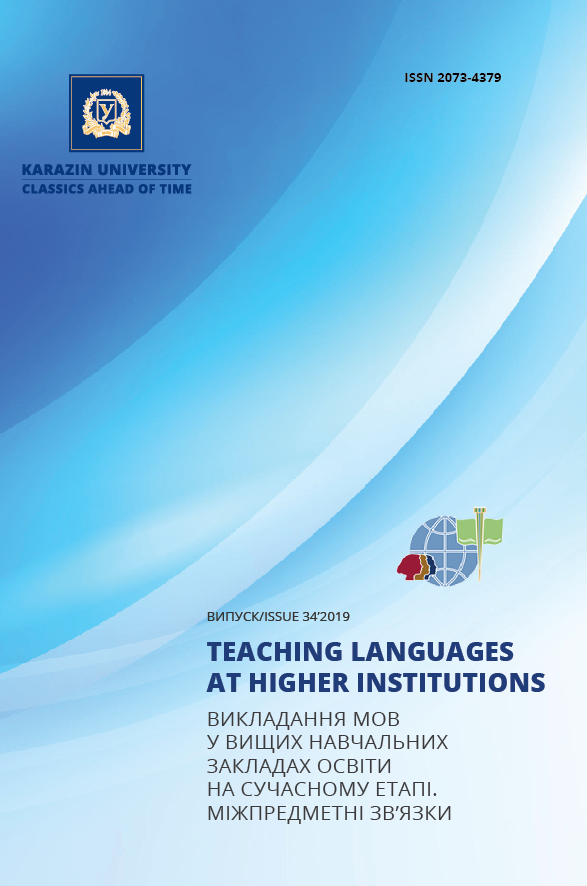The aspects of using an intermediary language in teaching Ukrainian as a foreign language
Abstract
The article discusses the aspects of using an intermediary language in teaching a foreign language, in particular, Ukrainian. Different views on the place of the intermediary language in the process of teaching/learning are presented. Special attention is focused on the perspectives offered by the use of the intermediary language. Previous studies of the role of an intermediary language in teaching a foreign language show that this role is ambiguous. In the educational process the role of the intermediate language is performed by the most common languages. In modern conditions of globalization, there is a clear tendency to use English as a universal intermediary language. In a multinational audience, both the teacher and students will be comfortable enough to know a single intermediary language, clarify the translation, discuss grammatical features, check understanding of grammatical material, and get information to ensure successful adaptation of foreigners to life in a foreign country. The intermediary language helps the teacher to organize the learning process most effectively, relieve students of tension, accelerate and facilitate the learning of grammar and access to speech. The article concludes that an appeal to an intermediary language in the study of a foreign language should be considered methodically justified and expedient if its use improves the efficiency of the educational process. The most necessary and appropriate such treatment is at the initial stage, although at subsequent stages the mediation speech takes its place in the process of teaching/learning. Artificial exclusion of an intermediary language from the educational process can lead to a significant reduction in motivation, slowing the progress of students, and cause a state of frustration. Prospects for further research are the development of materials for the creation of textbooks on the Ukrainian language, which would take into account the intermediate language.
Downloads
References
Batsevich, F.S. (2009). Slovnyk terminiv mighkulturnoi comunicacii [Glossary of Terms of Intercultural Communication]. Available at: http://terminy-mizhkult-komunikacii.wikidot.com/m [Accessed February 24, 2019] [in Ukrainian].
Gusevskaya, N.Y. (2013). Evolutcia metodov obuchenia inostrannomu yaziky [The evolution of foreign language teaching methods]. Uchenie zapiski Zabaikalskogo gosudarstvennogo universiteta. Seriya: Professionalnoye obrazovaniye, teoriya i metodica obucheniya [Scientific notes of Transbaikalian State University. Series: Vocational education, theory and methods of training], 6, pp. 167–171 [in Russian].
Kazimirova, S.N. (2017). Yazyk-posrednik v prepodavanii inostrannogo yazyka [Language intermediary in the teaching of a foreign language]. Philologiya i lingvistica [Philology and linguistics], 1, pp. 48–52. Available at: https://moluch.ru/th/6/archive/45/1816/ [Accessed February 24, 2019] [in Russian].
Kasyanenko, T.A. (2013). Vykladannya ukrayinskoyi movy yak inozemnoyi: pryntsypy optynizatsiyi ta innovatsiyi [Teaching Ukrainian as a foreign language: principles of optimization and innovation]. Voprosy duhovnoi kultury – Filologicheskie nauki [Questions of spiritual culture Philological sciences], pp. 7–10. Available at: http://dspace.nbuv.gov.ua/bitstream/handle/123456789/92568/01-Kasianenko.pdf?sequence=1 [Accessed March 2, 2019] [in Ukrainian].
Kolosova, T.G. (2014). Ob osobennostyah prepodavaniya russkogo yazyka kak inostrannogo s ispolzovaniyem i bez ispolzovaniya yazyka-posrednika na nachalnom etape [On the peculiarities of teaching Russian as a foreign language with and without the use of an intermediary language at the initial stage]. Vestnik FGOU VO MGAU [Bulletin of FGOU VO MSAU], 1. Available at: https://cyberleninka.ru/article/n/ob-osobennostyah-prepodavaniya-russkogo-yazyka-kak-inostrannogo-s-ispolzovaniem-i-bez-ispolzovaniya-yazyka-posrednika-na-nachalnom-etape [Accessed March 2, 2019] [in Russian].
Kostomarov, V.G. and Mitrofanova, O.D (1979). Metodika kak nauka [Language teaching methods as a science]. Russkiy yazyk za rubezhom [Russian language abroad], 6, pp. 67–73 [in Russian].
Osintseva-Raevskaya, E.A. (2014). Rol i mesto rodnogo yazyka pri izuchenii russkogo yazyka kak inostrannogo [The role and place of the native language in the study of Russian as a foreign language]. Vestnik Baltiyskogo federalnogo universiteta im. I. Kanta [Bulletin of the Baltic Federal University. I. Kant], 5, pp. 96–102 [Accessed March 17, 2019] [in Russian].
Yankova, M.A. (2015). Angliyska mova u vykladanni ukrayinskoyi yak dopomizhniy factor formuvannya komunikatyvnoyi kompetentsiyi [English language in teaching Ukrainian as an auxiliary factor in the formation of a communicative competence]. Available at: http://kmp.fl.kpi.ua/sites/ default/files/yankova_multilingvizm_2015.pdf [Accessed January 28, 2019] [in Ukrainian].
Prodromou, L. From mother-tongue to other tongue. BBC Council teaching English. Available at: www.teachingenglish.org.uk/think/methodology [Accessed March 15, 2019] [in English].

